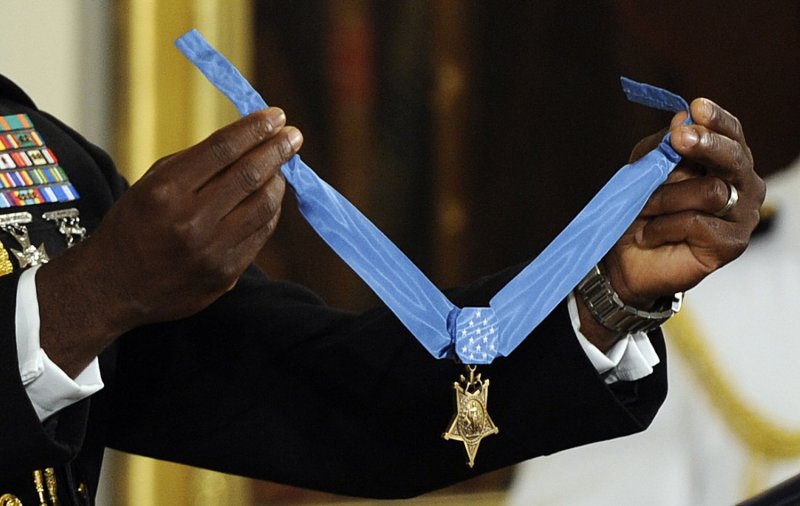Dakota Meyer, a former active duty Marine Corps Corporal, received this Medal of Honor for his actions in battle in Afghanistan during a ceremony in the East Room of the White House in Washington, DC, on September 15, 2011. The U.S. Supreme Court is considering a challenge to a federal law making it a crime to claim unearned military honors. UPI/Roger L. Wollenberg |
License Photo
WASHINGTON, Feb. 22 (UPI) -- Some U.S. Supreme Court justices expressed skepticism Wednesday about a federal law making it a crime to claim unearned military medals.
A series of U.S. laws since 1948 has made it a crime to falsely claim military decorations. The latest, the Stolen Valor Act, was passed by Congress and signed into law in 2006. A violation carries a possible year in prison plus a fine.
But a federal appeals court panel in California ruled 2-1 in a case involving a false claim of the Medal of Honor that such claims are protected by the First Amendment. Speech is speech, the panel majority said, even if it's a lie.
The panel majority declared the Stolen Valor Act unconstitutional.
The Obama administration then asked the U.S. Supreme Court to review and reverse the appeals court panel, restoring the act.
In argument before the Supreme Court, U.S. Solicitor General Donald Verrilli tried to define the law narrowly, SCOTUSBLOG.com reported, saying among other things that it did not apply to political candidates, parody, satire or simple exaggeration.
Justice Anthony Kennedy said the Supreme Court had never allowed Congress much leeway with a law that punished a false statement, the report said. Justice Sonia Sotomayor suggested that the government's argument amounted to the "somewhat dangerous" idea the Constitution gave no free speech protection for lying about medals.
In the California case, Xavier Alvarez won a seat on the Three Valley Water District Board of Directors in 2007. "I'm a retired Marine of 25 years," Alvarez told a neighborhood district board meeting. "I retired in the year 2001. Back in 1987, I was awarded the Congressional Medal of Honor. I got wounded many times by the same guy. I'm still around."
The only problem, the appeals court opinion said, was that "Alvarez has never been awarded the Congressional Medal of Honor, nor has he spent a single day as a Marine or in the service of any other branch of the U.S. armed forces. In short, with the exception of 'I'm still around,' his self-introduction was nothing but a series of bizarre lies."
Alvarez pleaded guilty in Los Angeles -- but reserved the right to challenge the constitutionality of the act on appeal. He was sentenced to a year on probation.
His lie was not unique. A July 2009 article in The Marine Corps Times found 40 doctored profiles in that year's Marine Corps Association Directory -- 16 made false claims for the Medal of Honor, 16 for the Navy Cross and eight for the Silver Star.















